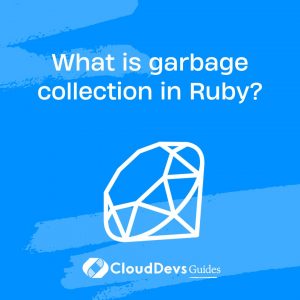What is garbage collection in Ruby?
Garbage collection in Ruby is a crucial process that manages memory resources by automatically identifying and reclaiming objects that are no longer in use. It plays a fundamental role in ensuring that your Ruby programs run efficiently and do not suffer from memory leaks or excessive memory usage.
Ruby employs a garbage collector to automatically reclaim memory occupied by objects that are no longer accessible or referenced by the program. This process prevents memory leaks, where memory is allocated but never released, and allows developers to focus on writing code without having to manually manage memory allocation and deallocation.
The core principle behind garbage collection is to identify objects that are no longer reachable through any reference in the program. Ruby uses a tracing garbage collector that starts from a set of root objects, such as global variables and objects in the current call stack, and traces all references to other objects. Any objects that are not reachable are considered eligible for garbage collection.
Ruby’s garbage collector employs various strategies to efficiently identify and reclaim memory, such as mark-and-sweep, generational garbage collection, and reference counting. These strategies work together to strike a balance between memory reclamation and performance, ensuring that the garbage collection process has minimal impact on your program’s execution speed.
Developers typically do not need to interact directly with the garbage collector in Ruby, as it operates automatically in the background. However, understanding how it works can be beneficial when dealing with large and long-running applications, as optimizing memory management can have a significant impact on performance.
Garbage collection in Ruby is the automated process of identifying and cleaning up memory that is no longer in use, ensuring efficient memory utilization and preventing memory-related issues. Ruby’s garbage collector handles this task transparently, allowing developers to focus on writing clean and functional code without worrying about memory management.







